Early New England Architecture
& Historic Preservation
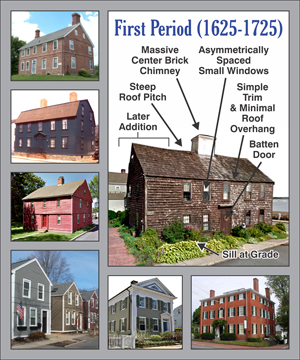
Despite the "march of progress," there are still impressive concentrations of early domestic architecture throughout all six New England states.
The First Period house (1625-1725) with features pointed out at right is a c. 1700 home in Newburyport, Mass. In the smaller photos, from top left, are the 1710 Weeks Brick House in Greenland, N.H.; a Georgian-style house (1725-1780) in Newport, R.I.; a 1740 house in Middletown, Conn.; a row of 1850s mill-worker's houses in Newburyport, Mass.; a Greek Revival house (1825-1850) in Stonington, Conn.; and the 1808 John Cushing House, a Federal-style house (1780-1830) in Newburyport, Mass.
Below are publications in this category currently available. Click on any book title below and you'll go to a page with a more detailed description of the book, a preview of selected pages, and a link to purchase and pay via PayPal.
Click on any title below for more information,
and to read the contents and introduction.
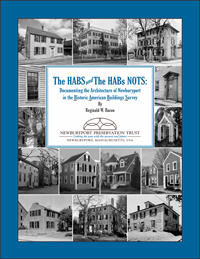
The HABs and the HABs NOTs:
Documenting the Architecture
of Newburyport
in the Historic American
Buildings Survey
by Reginald W. Bacon
(Newburyport, Mass.:
Variety Arts Press, 2017)
8.5x11.0, 160 pages;
casebound (hardcover)
ISBN: 978-0-9977528-1-6
LOC: 2016920943
$35.00 (US) includes
book-rate shipping in the U.S.
Payment accepted by PayPal
(see "Buy Now" below or on the
full description page).
To order by postal mail, send order details, your shipping address, and payment by check to Variety Arts Enterprises, P.O. Box 489, Newburyport, MA 01950.
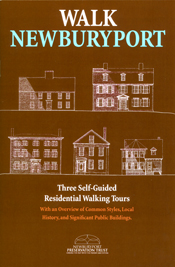
Walk Newburyport:
Three Self-Guided
Residential Walking Tours,
with an Overview
of Common Styles, Local History,
and Significant Public Buildings
by the Newburyport Preservation Trust
(Newburyport, Mass.: NPT, 2011)
6x9 softcover, 32 pages,
with illustrations, maps, & photos
$14.00 (US) includes book-rate shipping in the U.S.
Payment accepted by PayPal
(see "Buy Now" below or on the full description page).
To order by postal mail, send order details, address, and payment by check to Variety Arts Enterprises, P.O. Box 489, Newburyport, MA 01950.
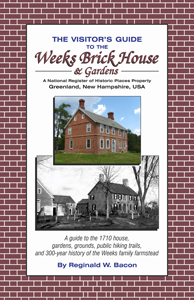
The Visitor's Guide
to the Weeks Brick House & Gardens
A guide to the 1710 house,
gardens, public hiking trails,
and 300-year history
of the Weeks family farmstead
by Reginald W. Bacon
(Newburyport, Mass.:
Variety Arts Press, 2015)
5.5x8.5, softcover, 60 pages
ISBN: 978-0-9817945-9-4
LOC: 2015914615
$16.00 (US) includes
book-rate shipping in the U.S.
Payment accepted by PayPal
(see "Buy Now" below or on the full description page).
To order by postal mail, send order details, your shipping address, and payment by check to Variety Arts Enterprises, P.O. Box 489, Newburyport, MA 01950.
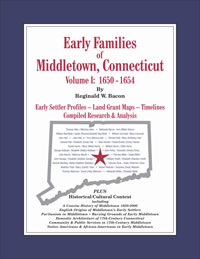
Early Families
of Middletown, Connecticut
- Vol. I: 1650-1654
(Early Settler Profiles,
Land Grant Maps, Timelines,
Compiled Research & Analysis,
... including 17th-Century
Domestic Architecture)
By Reginald W. Bacon
(Newburyport, Mass.:
Variety Arts Press, 2012)
8.5x11.0, 195 pages; comb-bound
ISBN: 978-0-9817945-5-6
LOC: 2012949502
$50.00 (US) includes
book-rate shipping in the U.S.
Payment accepted by PayPal
(see "Buy Now" below or on the full description page).
To order by postal mail, send order details, your shipping address, and payment by check to Variety Arts Enterprises, P.O. Box 489, Newburyport, MA 01950.
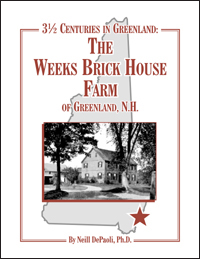
3 1/2 Centuries in Greenland:
The Weeks Brick House Farm
of Greenland, N.H.
By Neill DePaoli, Ph.D.
(Newburyport, Mass.:
Variety Arts Press, 2010)
44 large-format pages
ISBN: 978-0-9817945-4-9
Please note that this publication is available for purchase through the Weeks Brick House & Gardens.
$25.00 (US) includes shipping.
Payment accepted by PayPal (at the Weeks Brick House & Gardens web site).
To order this title by postal mail, send order details, your shipping address, and payment by check directly to the Weeks Brick House & Gardens, P.O. Box 93, Greenland, NH 03840.
Forthcoming titles in progress:
- Early Families of Middletown, Conn. - Vol. II: 1654-1700, by R.W. Bacon.


